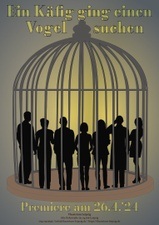In the organizer's words:
Franz Kafka's stories live from the grotesque image sequences and exaggerations of early cinema, which recur here in literary condensation: in the rhythm of metropolitan traffic, in chases and double-crossing scenes, in crime and pathos, in the gestures of fear and the shadow plays of horror. Peter-André Alt's lecture offers a multitude of surprising discoveries that shed a completely new light on Kafka's texts as a model of cinematic storytelling.
His letters and diaries document that Kafka was a passionate moviegoer. Until now, however, it has been overlooked how strongly his literary work was also determined by the forms of perception and representation of film. The lecture shows various forms of Kafka's cinematographic narrative, which become apparent in the techniques of linking images, the use of concrete motifs, the visual perspectives, the body language of the characters and the dramaturgical patterns of his stories. This opens up an astonishing panorama of literary patterns in which Kafka adapts the movement sequences and camera angles, the material and the myths of early cinema. The study presents numerous findings and observations that make the great modern classic more comprehensible than ever before.
This is followed by the film "The Other" (Germany 1913 by Max Mack, 77 min, German subtitles, viragized), which Franz Kafka had already seen in the cinema.
The lawyer Dr. Hallers represents criminals with personality disorders. But after a fall, he himself suffers from a change in consciousness and transforms into the Other. His alter ego now roams the Berlin demimonde...
DER ANDERE by Max Mack was described as the first German auteur film. Mack's work also helped the young medium of film to gain a higher profile among the culturally sophisticated middle classes. In addition to the theater dramaturge Paul Lindau, Mack was able to secure the renowned stage actor Albert Bassermann for the leading role.
A film from the collection of the Friedrich-Wilhelm-Murnau-Stiftung(www.murnau-stiftung.de) in Wiesbaden.
Price information:
Tickets at the Schaubühne, online and at all Reservix box offices: 9 / 7 (reduced) euros













